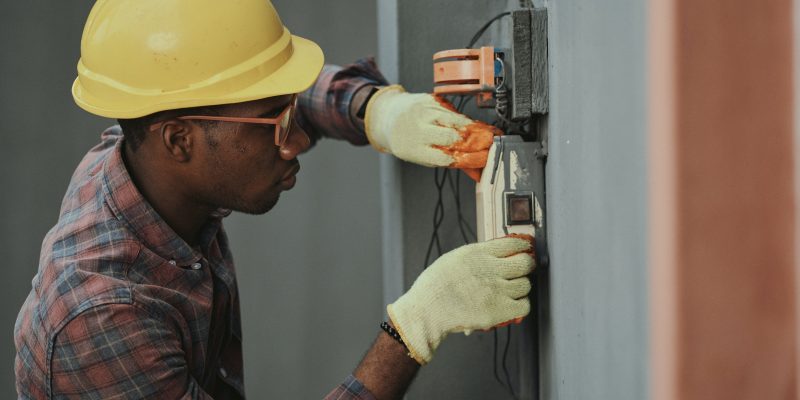Electrical safety is a topic that many people don’t fully understand. It can cause severe accidents and be the cause of death.
If you become more familiar with electrical safety, you’ll understand why it’s essential to learn about this subject. It will help you make informed decisions when working around electrical equipment.
Keep Electrical Equipment Away From Water
Keeping electrical equipment away from water is essential because it can be hazardous. Water can corrode wires, causing them to short out or become damaged. If you see that your wires are exposed to water, you should unplug everything and dry off the area before plugging them back in.
Avoid any type of water near your electrical devices and equipment—from rain to puddles to washing machines—which can cause severe problems with electrical equipment.
If you’re using a washing machine, ensure that the electrical outlet you plug it into is not exposed to any water. If you have an outdoor shed or workshop, ensure the electrical outlets are kept dry and free from debris (including leaves).
Keep Electric Cords And Plugs In Good Condition
The most important thing you can do to keep your electrical safety in mind is to keep your electric cords and plugs in good condition.
To ensure that your electric cords and plugs are safe, follow these guidelines:
- Do not cover them with plastic or tape; this can cause damage to their insulation and may even lead to a fire.
- Only use extension cords for one appliance (for example, you should not use an extension cord to power a whole house of appliances).
- If the cord has been damaged by water or looks frayed, replace it immediately.
Have The Electrical System Inspected Regularly By A Professional
It’s essential to have the electrical system regularly inspected by a professional. It will ensure you’re up-to-date on potential hazards and avoid them.
Electrical systems are complex, and it’s vital to have them inspected regularly by a professional.
If you need to know what your electrical system looks like, it’s easy to become complacent about safety and neglect regular maintenance. But if something goes wrong, it could be catastrophic.
A professional can check the layout of your home’s main electrical panels; just ensure they have the Certificate of Compliance for Electrical Work. They’ll check everything up to the condition of your outlets and lights, and they will do it efficiently and affordably.
Don’t Use Electrical Equipment That Has Visible Signs Of Damage
When it comes to electrical safety, it is essential to watch for signs of damage.
A lot of electrical equipment can be repaired or replaced—but that doesn’t mean you should use it if there are obvious signs of damage.
If your light bulbs are missing and the cord is frayed, for example, or all of your outlets are acting weird, use them sparingly.
Ensure All Outlets Have The Appropriate Cover Plates
It is one of the most critical tenets of electrical safety. If you have outlets that have cover plates, they should be securely fastened in place. If they are not secured, they could become a trip hazard or cause someone to be injured if they fall onto the outlet.
To ensure that your outlets are appropriately covered, follow these steps:
- Turn off the power to the outlet by turning off the breaker or circuit breaker. Contact your electrician for assistance if you don’t know how to do this.
- Locate all need to learn/or outlets on a wall or ceiling so that you can see them clearly without having to lean over too far or stand too close to them (this is especially important when working in an area with many outlets).
- Check each outlet for loose cover plates or cover plates that may have fallen off from the wall behind them (if necessary, use another tool, such as a screwdriver or hammer, to pry off these covers gently).
Unplug Appliances If You’ll Be Away From Home For An Extended period
Unplug appliances when you’re away from home for an extended period. It includes refrigerators, stoves, and other appliances that may have been left on for days.
If you’re away from home for more than 3 days, unplug all electrical devices and appliances from the wall socket. If you are away for more than 3 days, wait to plug anything into the wall outlet until you return.
You can also list your phone number on the side of the outlet box so that if any appliances begin to malfunction while you’re gone, someone can call you in case of an emergency.
Never Try To Make A Repair Yourself If You Aren’t Qualified
It’s essential for everyone—especially kids—to understand that electricity can be dangerous if mishandled. But it’s also vital for adults to know that it’s not just children who have trouble understanding the rules around electricity.
There are many reasons why an adult might need help with electrical work: they might have been injured in a fire or accident, or they might have experienced some injury due to their carelessness.
Either way, there’s no reason for any adult to attempt repairs independently unless they’re qualified and feel comfortable doing so.
Always Wear Protective Gear When Working With Electricity
It’s also important to realize that electricity can be hazardous, even if it doesn’t feel dangerous—the voltage involved in specific electrical systems can be enough to cause burns and other injuries.
Always wear appropriate safety equipment when working around any electrical equipment. It includes:
- A proper set of work gloves
- A face mask or respirator for dust
- Safety glasses or goggles with side shields
Final Thoughts
Implementing these safety principles can help you avoid harm and also help prevent structural fire damage and even a potential electrical fire.
The key to safety is following the guidelines, so you don’t end up on the wrong side of a lawsuit or, worse, the hospital.
To avoid any issues in the future, contact your local electrician and have them conduct a home inspection to ensure all wiring is up to date and all requirements are met.




















